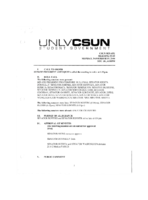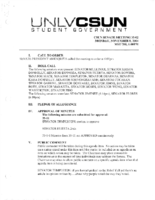Search the Special Collections and Archives Portal
Search Results

Transcript of interview with Dr. Harrie Fox Hess by Scot Siegel, February 26, 1979
Date
Archival Collection
Description
On February 26th, 1979, Scot Siegel interviewed his psychology professor, Dr. Harrie Hess (born March 1, 1929 in Hammond, Indiana) in his office at the University of Nevada, Las Vegas. Dr. Hess discusses his family’s reason for moving to Nevada and how he felt as a young adult moving to Las Vegas. The two go on to talk about Dr. Hess’ contributions to Nevada through his work as a psychologist, and briefly mentions the first law to be drafted on psychology certification in Nevada. Dr. Hess then describes the Wild Cat Lair as an important site of social recreation for early Las Vegas youth. The interview concludes with his memory of Boulder (Hoover) Dam and how he believes that workers from the Great Depression paved the way for industrial success in gambling due to their employment on the Dam.
Text

Transcript of interview with Steven Eisen by Barbara Tabach, September 14, 2016
Date
Archival Collection
Description
Steven Eisen (1966 - ) is the oldest son of Barry and Beverly Eisen, who were part of the migration of Jews from St. Louis to Las Vegas in the 1960s. He is married to Stacy Fisher and the older brother to Andrew and Robert Eisen. They are members of an early group of born-and-raised Las Vegans. Growing up Jewish, he became a bar mitzvah, belonged to B?nai B?rith Youth Organization. In this oral history interview, Steve recalls enjoyable stories of growing up in Las Vegas and humorous anecdotes of mistaken identity since the three brothers bear such strong physical resemblances. Today he finds himself enjoying his career as CEO of the Children?s Heart Center since 2001 and talks about the success and reputation of the pediatric medical group. It was his first job as a fourteen year old helping Theodore Manos and Michael Cherry during the MGM fire litigations where he learned about the legal world and being organized as a path to success in whatever he might pursue. Steve graduated from University of Missouri, attended law school at Washington University in St. Louis, and received his business degree from UNLV. Throughout the interview, he recalls the steady and strong involvement of his parents in their sons? educations. He also describes their active connection with the Jewish community and organizations. Steve?s wife Stacy is a professor in physical therapy at Touro University.
Text

Transcript of interview with Colleen Gregory by Tim Waters, April 6 & 7, 1976
Date
Archival Collection
Description
On April 6 and 7, 1976, Tim Waters interviewed Colleen Gregory (born 1928 in Santa Clara, Utah) about her life in Southern Nevada. Gregory first talks about her original move to Las Vegas, her early education, school activities, and her college education. She also talks about the first banks, Helldorado, the atomic testing, and environmental changes. Other topics covered include Howard Hughes, Western-style influences, first properties on the Strip, World War II, racial prejudice, and changes she has noticed during her career in banking.
Text

Transcript of interview with Dorothy Ross Fletcher by Sharon Hildebrandt, June 26, 1975
Date
Archival Collection
Description
On June 26, 1975, Sharon Hildebrandt interviewed Dorothy Ross Fletcher (born 1936 in Las Vegas, Nevada) about growing up in and living in Southern Nevada. Fletcher first talks about that various towns in which she lived while growing up before discussing the schools she attended. She also discusses the changes in schools, her involvement in politics, church activity, gambling as a recreational activity, and prominent visitors who came to Las Vegas. Fletcher also talks about living in Nevada during World War II, the atomic testing, environmental changes and extreme weather, and the social changes in Las Vegas. The latter part of the interview involves discussion of real estate, the introduction of air conditioning for cooling, changes on the Las Vegas Strip, recreational activities available to youth in Las Vegas and the increase in the nonnative population.
Text

Myron E. Leavitt interview, March 14, 1978: transcript
Date
Archival Collection
Description
On March 14, 1978, collector Thomas Neill interviewed Myron E. Leavitt (born October 27th, 1930 in Las Vegas, Nevada) at his law office in Las Vegas, Nevada. In this interview, Leavitt discusses his law practice and running for various positions in Las Vegas, Nevada. He also speaks about growing up, playing sports, and coaching multiple sports in Las Vegas.
Text

Louise LeClair interview, March 21, 1978: transcript
Date
Archival Collection
Description
On March 21, 1978, collector Dennis Luppens interviewed Louise LeClair (born July 28th, 1910 in Mesquite, Nevada) at her home in Las Vegas, Nevada. In this interview, Mrs. LeClair discusses her family history and education in Las Vegas, Nevada. She also discusses healthcare and talks about the flu epidemic of 1918 and how it affected Southern Nevada.
Text

Interview with Wayne Albert Violette, January 12, 2005
Date
Archival Collection
Description
Text

Meeting minutes for Consolidated Student Senate, University of Nevada, Las Vegas, November 15, 2004
Date
Archival Collection
Description
Text

Meeting minutes for Consolidated Student Senate, University of Nevada, Las Vegas, November 08, 2004
Date
Archival Collection
Description
Text

Meeting minutes for Consolidated Student Senate, University of Nevada, Las Vegas, March 15, 2004
Date
Archival Collection
Description
Text
